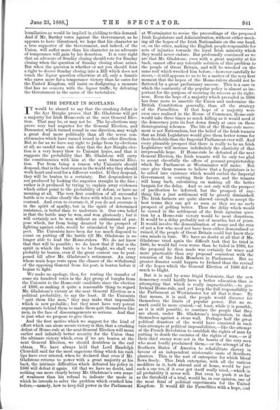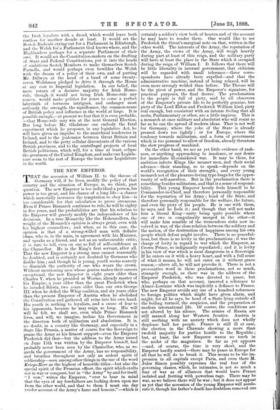THE DEFEAT IN SCOTLAND.
IT would be absurd to say that the crushing defeat in the Ayr Burghs proves that Mr. Gladstone will get a majority for Irish Home-rule at the next General Elec- tion. That may be, or may not be. The by-elections may prove very bad auguries for the General Election, and Doncaster, which turned round in one direction, may weigh a great deal more politically than all the seven con- stituencies which have turned round in the other direction. But so far as we have any right to judge from by-elections at all, no candid man can deny that the Ayr Burghs elec- tion is a very heavy blow to Unionist hopes, and that it suggests the probability that Mr. Gladstone will carry the constituencies with him at the next General Elec- tion. Far from being a reason why Unionists should despond, that is the best reason in the world why they should work heart and soul for a different verdict. If they despond, they will be beaten to a certainty. But despondency is not produced by looking the auguries straight in the face ; rather is it produced by trying to explain away evidences which either point to the probability of defeat, or have no meaning at all. The very first condition of all successful battle is to realise clearly the force with which you have to contend. And even to overrate it, if you do not overrate it in the spirit of apathy, but in the spirit of determined resistance, is better than to underrate it. Our ovvn belief is that the battle may be won, and won gloriously ; but it will certainly not be won without an enthusiasm of pur- pose which, far from being daunted by the prospect of fighting against odds, would be stimulated by that pros- pect. The Unionists have been far too much disposed to count on putting off the -battle till Mr. Gladstone is no longer able to lead the Home-rulers. We do not know that that will be possible ; we do know that if that is the spirit in which the battle is to be fought, we shall very probably be beaten, even if the great contest can be post- poned till after Mr. Gladstone's retirement. An army whose main hope rests upon the chance of the withdrawal of the opposing General from his post, is beaten before it begins to fight.
We make no apology, then, for reating the transfer of some six hundred votes in the Ayr group of burghs from the Unionist to the Home-rule candidate since the election of 1886, as making it quite a reasonable thing to regard Mr. Gladstone's victory at the next General Election as a political probability, to say the least. If the Unionists " quit them like men," they may make that impossible which is now probable ; but they must have very potent arguments behind them to make them quit themselves like men, in the face of discouragements so serious. And that is just what we propose to give them.
And the first motive which we suggest for the kind of effort which can alone secure victory is this, that a crushing defeat of Home-rule at the next General Election will mean earlier and infinitely better security for the Union than the ultimate victory which, even if we are beaten at the next General Election, we should doubtless in the end obtain. We have always held that Lord Randolph Churchill said far the most sagacious thing which his rash lips have ever uttered, when he declared that even if Mr. Gladstone returns to power with a great majority at his back, the intrinsic difficulties which defeated his policy in 1886 will defeat it again. Of that we have no doubt, and nothing can more clearly betray Mr. Gladstone's own sense of weakness than his refusal to indicate the mode in which he intends to solve the problem which crushed him before,—namely, how to keep full power in the Parliament , at Westminster to revise the proceedings of the proposed Irish Legislature and Administration, without either mock- ing all the hopes of the Irish Nationalists on the one hand, or, on the other, making the English people responsible for acts of injustice towards the loyal Irish minority which they would never endure. But profoundly convinced as we are that Mr. Gladstone, even with a great majority at his back, cannot offer any tolerable solution of this problem to the people of Great Britain, and will be wrecked on the same reef which wrecked him before,—however carefully he steers,—it still appears to us to be a matter of the very first moment that the hopes of the Home-rulers should not be flattered by a great preliminary success. This is a case in which the continuity of the popular policy is almost as im- portant for the purpose of securing its success as its right- ness. Even the hope of a majority which prevailed in 1886 has done more to unsettle the Union and undermine the British Constitution generally, than all the strategy of the Parnellites. If that hope of a majority were even once realised in the House of Commons, Home-rule would take three times as much killing as it would need if the democracy puts its foot down firmly at once on these disintegrating schemes. The life of the Home-rule move- ment is not Nationalism, but the belief of the Irish tenants that an Irish Legislature would give them better terms for their freeholds than the Imperial Parliament ever will. And every plausible prospect that there is really to be an Irish Legislature will increase indefinitely the elasticity of that irrepressible hope. If Home-rule be defeated at the next General Election, the Irish tenants will be only too glad to accept cheerfully the offers of peasant-proprietorship which the Parliament at Westminster will make. But once give them reason to believe that a Legislature is to be called into existence which would outbid the Imperial. Government in courting their favour, and the tenants will hang back, calculating on making all the better bargain for the delay. And so not only will the prospect of pacification be deferred, but the prospect of any- thing like a just settlement will be greatly diminished. The Irish farmers are quite shrewd enough to accept the best terms they can get so soon as they see no early prospect of getting better. Thus the delay which would be caused in the settlement of the Irish agrarian ques- tion by a Home-rule victory would be most disastrous. It would be a delay probably not of months, but of years. It would involve the demoralisation of many and the ruin of not a few who need not have been either demoralised or ruined, if the people of Great Britain could but know their own minds in time. We have no doubt at all that if Mr. Gladstone tried again the difficult task that he tried in 1886, he would fail even worse than he failed in 1886, for the proposal he then made was certainly far wiser and more practicable than any proposal consistent with the retention of the Irish Members in Parliament. But no greater disaster could happen to Ireland than the revival of the hopes which the General Election of 1886 did so much to blight.
But it is said by some frigid Unionists, that the new. democracy could hardly have a better education than in attempting that which is really impracticable,—to give Ireland Home-rule, and yet keep the full responsibility in the Parliament at Westminster for all that is done. By that means, it is said, the people would discover for themselves the limits of popular power. But no re- mark could be more cynical,—at least, while it is possible, as it is still possible, to convince the people that they are about, under Mr. Gladstone's inspiration, to dash themselves against a stone wall. Perhaps half the great political disasters of the world have consisted in such vain attempts at political impossibilities,—like the attempt of the French Revolution to establish the rights of man by putting to death the enemies of the rights of man,—as if their chief enemy were not in the hearts of the very men who most loudly proclaimed them,—or the attempt of the Southern States of America to rehabilitate slavery in favour of an independent aristocratic caste of Southern planters. This is the sort of enterprise for which blood flows freely. This Irish enterprise, with all the varioua meddlers in it, both abroad and at home, would be just such a one too, if it ever got itself really tried,—which in all probability it never will. But even to push it as far as the threshold of a trial, would be, in our opinion, one of the most fatal of political experiments for the United Kingdom. It would fill the Parnellites with a hope, and the Irish loyalists with a dread, which would leave both restless for another decade at least. It would set the Scotch Radicals crying out for a Parliament in Edinburgh, and the Welsh for a Parliament God knows where, and the Highlanders perhaps for a separate Parliament of their own. It would set the Constitution-makers on the drafting of State and Federal Constitutions, put it into the heads of ambitious Scotch Members to make themselves Scotch Parnells, and would perhaps even bewilder the Welsh with the dream of a policy of their own, and of putting Mr. Dillwyn at the head of a band of some twenty- seven Welshmen pledged to drive it through the House at any cost to Imperial legislation. In our belief, the mere return of a decisive majority for Irish Home- rule, though it would not bring Irish Home-rule any nearer, would make politics for years to come a perfect labyrinth of tortuous intrigues, and endanger most seriously the strength, the significance, the common-sense of British policy and influence in the world at large. It is possible enough,—at present we fear that it is even probable, —that Home-rule may win at the next General Election. But long before Mr. Gladstone can embody the fatal experiment which he proposes, in any legislative Act, he will have given an impulse to the anarchical tendencies in Ireland, and to the jealousies between Great Britain and Ireland, and to the petty cellular discontents of the various British provinces, and to the centrifugal projects of local British politicians, which will, for a time at least, eclipse the greatness of the United Kingdom, and make our Legisla- ture seem to the rest of Europe the least sane Legislature in the world.







































 Previous page
Previous page